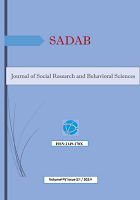Eğitsel Süreçlerde Mesleki Yeterlik ve Yeterlik Elementlerinin Entegrasyonu
Integration of Professional Competence and Competence Elements in Educational Processes
Author(s): Emre ZebaloğluSubject(s): Education, Sociology of Education
Published by: SD Yayınevi
Keywords: Educational Processes; Professional Competence; Integration of Competence Elements;
Summary/Abstract: The most important of the methods used in training and development is to shape the knowledge, skills and competencies of the employees of the organization. Education is essentially the internalization of knowledge, while skills and attitude/behavior are related to each other and successive roles. The development is that this trio quickly becomes an observable action in practice as competence. In modern business discourses, the concept of skill has turned into the concept of competence. Competence is a difference in performance that distinguishes effective managers from ineffective managers in a particular organization. since the 1970s, competencies have been the main starting point for evaluating personnel performance in human resources management; competence has been defined as the successful fulfillment of critical tasks and tasks, the potential to apply and use the knowledge, skills and behaviors necessary for a specific role or position. According to a different view, competencies are an output of continuous learning adaptation, the creation of new skills and the sustainability of achievements. Education is an activity of acquiring or producing competencies that are potentially produced in the process of professional development of a person. Since the earliest historical times, the integration of learning activities of knowledge, skills and procedures, the practice, rules and impact of education have been part of the sustainability of society. In social/cultural theories, the knowledge and skills of individuals are seen as inseparable from the social world in which they think and act. Knowledge and skills are the elements that make up competence. When attitude/behavior is developed after knowledge and skills are acquired, declarative and procedural knowledge turns into implicit knowledge, and functional competence emerges, and this triple integration process is completed, the entire process turns into professional competence. The professional competencies that they must acquire by completing the knowledge-skill-attitude integration process have been defined as basic and professional (professional) competencies as a functional competence.
Journal: Sosyal Araştırmalar ve Davranış Bilimleri
- Issue Year: 10/2024
- Issue No: 21
- Page Range: 631-642
- Page Count: 12
- Language: Turkish

